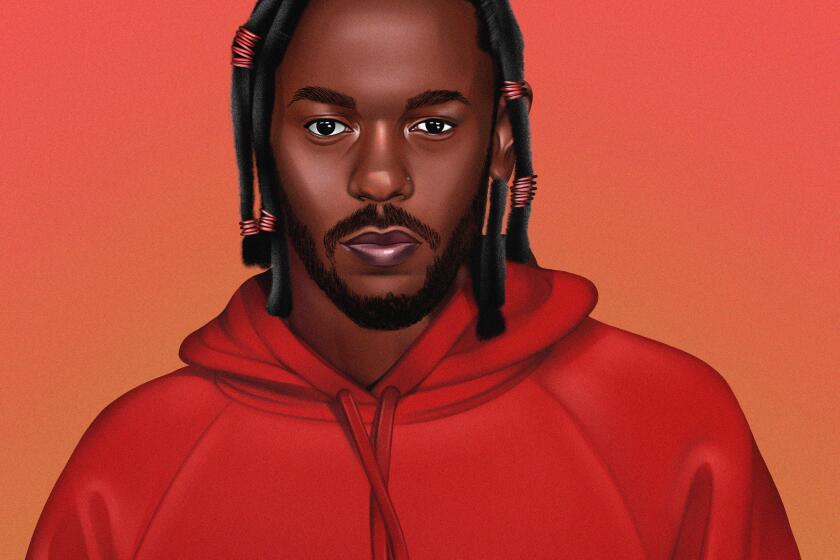‘Good Omens,’ ‘Killing Eve’ and ‘Russian Doll’: Odd pairings creating compelling TV
As author Neil Gaiman recalls, when he and the late Terry Pratchett joined forces to write their 1990 novel “Good Omens,” they made one critical decision that changed everything: They split up.
Rather, they split a character up. “The best and smartest thing he did was to make one character into two,” says Gaiman of Pratchett, who died in 2015. “We ended up with a worldly demon and an angel. The joy of that was it gave us conversations in which they could each take different sides, and persuade one another. Once you have that — you have drama,” adds Gaiman, now showrunner on the Amazon Prime adaptation of “Omens,” which drops Friday.
Across television, no matter what the platform, the basic theory when constructing a show seems to be that two heads are better than one — and two leads are often an instant shortcut to telling a great story. Even better is when those two characters are natural opposites but have commonalities that join them as friends, partners, or even just grudging allies.
FULL COVERAGE: Get the latest on awards season from The Envelope »
Nic Pizzolatto, showrunner on HBO’s “True Detective,” knows the power of two — each season he creates a fresh pair of investigators who each see the world through unique, and not always simpatico, lenses. And his style of character creation mirrors Gaiman and Pratchett’s.
“I usually have one character first,” he says. “When seeing the world through a character’s eyes, and articulating their point of view for life, it’s almost like a counterargument rises up. Then I find I’m inhabiting that second point of view. It creates a natural engine for revealing character and story.”
“Detective” is a solid drama, but comedy is also a natural home for strange companions. On Netflix’s “Grace and Frankie,” two naturally opposite women discovered a great friendship — after their husbands left them for each other. But creator-showrunner Marta Kauffman says they still have to showcase their differences.
“No show is good without conflict,” she notes. “These two women will never see eye-to-eye about everything. In all cases, though, there has to be love underneath, or it doesn’t work.”
“Russian Doll,” flipped around predictable male-female roles in a duo of opposites to keep things fresh, says showrunner Leslye Headland. “Usually, if women are part of a comedic duo, they’re the straight man or the buzz kill. We inverted those gender tropes — this time, it was the guy who’s so buttoned-up, trying to control things. That’s what made Alan and Nadia’s connection and the chemistry between the actors so compelling — it’s something you’ve seen before, but not quite in this way.”
But there’s a risk in having the characters become too chummy because they start to see each other’s take on the world, which can flatten out the conflict. Says Kauffman, “I don’t worry that this two-women-against-the-world [concept] will grow tired — but I worry more about where the next story is coming from, because they’re so lovable.”
That’s when savvy showrunners find ways to let their creations evolve, as on the second season of BBC America’s “Killing Eve.” By the end of Season 1, an assassin (Villanelle) and an investigator (Eve) became a little too fascinated with one another, and Eve suddenly — and brutally — stabbed Villanelle.
“You can’t keep playing cat and mouse forever,” says executive producer Sally Woodward Gentle. “Relationships do need to develop. So we had one woman stab another when her life wasn’t under threat — and that’s an extraordinary place to be, to realize you have that in yourself. And with a character like Villanelle, who’s a psychopath and not afraid of anything, she learns she’s not the Terminator. You can mortally wound her, and it is going to hurt.”
Still, adds Pizzolatto, not every relationship has to be a yin-and-yang oppositional force setup: “You just need a dynamic that allows you to explore argument, counterargument, point, counterpoint in a way that, if it’s done carefully, will allow each character the full scope of their truth and dignity.”
More to Read
From the Oscars to the Emmys.
Get the Envelope newsletter for exclusive awards season coverage, behind-the-scenes stories from the Envelope podcast and columnist Glenn Whipp’s must-read analysis.
You may occasionally receive promotional content from the Los Angeles Times.






